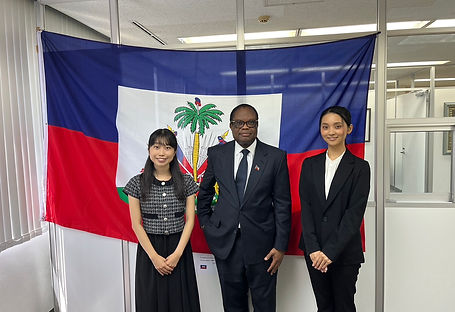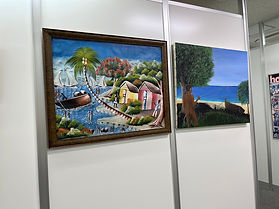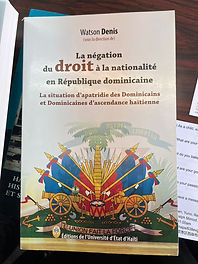Haiti
On September 5th, 2023, the International School Network visited the Embassy of Haiti in Japan for an interview with Chargé d'Affaires Mr. Watson DENIS.


Mr. DENIS describes the core mission of Haiti’s education system as "building the Haitian soul." He explained that for a people with a history marked by colonization and slavery, it is crucial for every Haitian to understand their origins and their identity as a black nation in the world. Education, in this sense, is not just about academic knowledge but about fostering a profound sense of belonging. The national language, Haitian Creole, is a direct creation of the Haitian people, contrasting with French, the language inherited from their colonizers, and stands as a key cultural element that binds the country together.
Recalling his own journey, Mr. DENIS shared that his early aspirations were to become a Catholic priest or a doctor. However, as he grew older, his intellectual curiosity shifted, leading him to pursue a career as a professor of social science and eventually into the world of international relations and diplomacy. This path, which led him to his current role working at the Ministry of Foreign Affairs, was driven by a desire to learn about other cultures and to serve his nation on a global stage. This journey, he noted, demonstrates that life's path is not always linear, but what matters most is following a passion for learning and a desire to contribute.
Mr. DENIS’s vision for world peace is centered on dialogue. He believes that many conflicts and wars arise from a fundamental lack of communication and that through dialogue, many problems can be solved. He urged people to understand the perspectives of their neighbors, both literally and figuratively.
In his message to the Japanese people and students, he encouraged them to "continue on the same path" of discipline and organization that he found so surprising upon his arrival in Japan. He was particularly struck by the country’s high level of infrastructure and modernization. He encouraged Japanese students to study hard and secure influential positions in the world, using their success to benefit others. He also expressed a deep desire for more Japanese people to visit Haiti, to learn about its rich culture and history, rather than relying solely on media portrayals. He has written books and articles, such as one titled "Haiti changes the course of History," that may help foster a deeper understanding and connection between the two nations.



Haiti
On March 23rd, 2022, the International School Network visited the Embassy of the Republic of Haiti to interview the Ambassador, His Excellency Dr. Helph Monod Honorat.
Culture/Industry
What do you believe unites the nation, and what are some cultural values that you see in the people of your country?
His Excellency mentioned that culture unites the nation. Haiti has one of the most vibrant cultures. The music, art, dance, and paintings are lively and you can feel the soul of the ancient people. The ancient paintings in Haiti use vibrant colors.
Can you please tell us about recommended tourist areas in your country?
H.E. recommended some places as tourist spots; Labadee, Citadelle Laferrière, and Jacmel. Labadee is a beautiful beach. Citadelle Laferrière is one of the World Heritage sites in Haiti. Jacmel is a city in Haiti and you can see Haitian art, culture, and annual carnival there.


Education
What are some similarities and differences you see between your country and Japanese students?
There are cram schools in Haitian, and many students study there on weekends. Also, many of them also participate in extracurricular activities after school.
What are some challenges that the Haitian education has?
Small villages in Haiti lack internet connection and access to computers. However, the Haitian government is supporting the education system.
The relationship between the two countries
What are some qualities of Haiti that you would like to bring awareness to people in Japan?
Haiti is located to the west of the Dominican Republic on Ispayola Island in the Caribbean sea. Haiti is the first independent country in Latin America, the second republic country in the American continent, and the first black republic in the world. Haitian people are kind and welcome. They speak French and Haitian, a creole language. H.E. said that he wants Japanese people to know Haitian culture and food.




Personal
As a child, what did you want to be when you grew up?
Since he liked mathematics, he wanted to become an engineer. As he started studying at a university, he became more interested in politics and economics, which relate to his career now.
What are your views on globalization?
H.E. defined globalization as interdependence of the world economy and cultures. He is optimistic about it since it encourages the investment of capitals. However, he stressed the importance of protecting Haitian identities.
What do you believe is the first step towards world peace? What do you believe is the first step towards ending world poverty?
He stated that the mutual understanding between countries is the first step towards world peace. Understanding foreign cultures and people will lead to respect for diversity in the world. To end world poverty, the fair distribution of natural resources should be realized according to H.E. Dr. Helph Monod Honorat. He also noted that improving education would help children to thrive.
What are your goals as an ambassador? What is your passion about working as the ambassador in Japan?
H.E. began working in Japan as an ambassador 2 years ago. H.E. stated that it is an honor to represent Haiti in Japan especially because he has studied in Japan before. As an ambassador his goal is to strengthen the educational relationship not only through exchange programs in JICA but also through others. He wishes Haitian students would study in Japan and learn something useful from the Japanese education system. Moreover, another goal H.E. mentioned is to cooperate in risk management with Japan as Haiti has a lot of earthquakes and to strengthen relations through agriculture by exporting Haitian cacao, coffee, and mango to Japan.
What are some traditional games you played when you were a child?
As a child H.E. played soccer with his friends and sister. In addition, H.E. also flew kites and enjoyed dancing.
Do you have a message towards Japanese students/people?
H.E. wants the Japanese to be aware of their strength of recovery from the war and disasters and know about Haitian culture and visit there so that the relationship of the two countries becomes much stronger.
H.E. decided to come to Japan, mainly because he wanted to discover a new culture. When he first came to Japan in 2008, he perceived the politeness of Japanese people. Meanwhile, he was surprised by the fact that Japanese people do not hug their friends. Also, using chopsticks was new to him, but he can handle chopsticks well now.
He found that Kobe University, where he studied for his doctor’s degree, did not have many interactions between students and professors compared to Haitian schools.
As he spent time in Japan, he became more eager to promote Haitian culture to Japanese people. Thus, he is working as an ambassador now and feeling proud to represent his country.
H.E. offered us Haitian coffee. The taste was so mild and fruity that we could enjoy the refreshing aftertaste. He also talked about Haitian food. Green bananas called plantains are common and those are usually boiled or fried. Also, Haitian people eat rice everyday, like Japanese. Furthermore, although he does not eat raw fish in Haiti, he likes Japanese sushi and sashimi.




^Painting of a small village in Haiti
Vodou is a Haitian traditional art. Most of these ancient paintings get sent to Canada, America, and Europe. Recently, there have been exhibitions of Haitian art in Tokyo, exhibiting metal art, pictures, and paintings.
Participants
Karen Nishina Sophia University
Yuno Sudo Yokohama National University
Rena Sakai Sophia University
